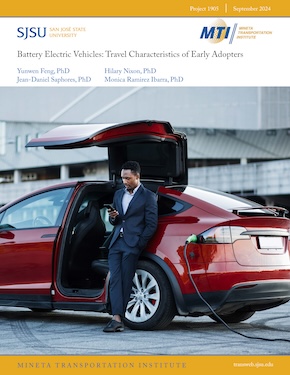- 408-924-7560
- mineta-institute@sjsu.edu
- Donate
Battery Electric Vehicles: Travel Characteristics of Early Adopters
Do U.S. households with battery electric vehicles (BEVs) drive less or more than U.S. households with internal combustion engine vehicles (ICEVs)? Answering this question is important to policymakers and transportation planners concerned with reducing vehicle miles traveled and the emissions of greenhouse gases from transportation. So far, this question has not been answered satisfactorily, possibly because of the relatively low number of EVs in the U.S. until recently, but also because of methodological issues. In this paper, we aim to fill this gap by analyzing data from the 2017 National Household Travel Survey (NHTS). We apply propensity score matching (PSM), a quasi-experimental method, to examine the differences in self-reported annual mileage and calculated daily mileage for various trip purposes among households with only BEVs (BEV-only), households with both BEVs and ICEVs (BEV+), and households without BEVs (non-BEV households). Our findings indicate that households with BEVs drive fewer annual miles than non-BEV households, but typically travel no less than they do for daily activities. This apparent discrepancy is likely due to taking fewer longer trips because the public charging infrastructure was still in its infancy in 2017, and its reliability was questionable. As technological progress is helping to overcome current battery limitations, policymakers may consider measures for fostering fast charging technologies while pondering new measures to fund both the charging infrastructure and the road network.
YUNWEN FENG, PHD
Dr. Yunwen Feng received her PhD from the University of California at Irvine in 2021. Her dissertation, An Analysis of Carsharing and Battery Electric Vehicles in the United States, provided much of the initial inspiration for this research.
JEAN-DANIEL SAPHORES, PHD
Dr. Jean-Daniel Saphores is an MTI Research Associate and Professor of Civil and Environmental Engineering at the University of California at Irvine, where he also serves as Chair of the Department of Civil and Environmental Engineering. Saphores focuses on transportation and environmental systems, which he analyzes using statistical and economic methods, combined with simulation and optimization tools. His active research interests include transportation and the environment (especially as it relates to air pollution and energy use), travel behavior analysis, alternative fuel vehicles, automated vehicles, transit use, sustainable infrastructure management, as well as decision making under uncertainty using real options.
HILARY NIXON, PHD
Dr. Hilary Nixon is Deputy Executive Director of the Mineta Transportation Institute and a faculty member in the MS Transportation Management program at San José State University. She specializes in transportation and environmental planning and policy, and her research focuses primarily on the factors that influence pro-environmental behavior and the relationship between transportation and the environment. She earned a BA from the University of Rochester and a PhD in Planning, Policy, and Design from the University of California, Irvine.
MONICA RAMIREZ IBARRA, PHD
Dr. Monica Ramirez Ibarra is an Assistant Project Scientist with the Institute of Transportation Studies at the University of California at Irvine.
-
Contact Us
San José State University One Washington Square, San Jose, CA 95192 Phone: 408-924-7560 Email: mineta-institute@sjsu.edu






